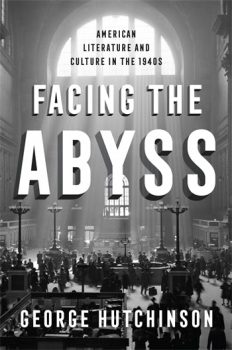Edward Mendelson in the New York Review of Books:
 George Hutchinson’s Facing the Abyss has bracing and revelatory things to say about American culture in the 1940s; also, by contrast and implication, about American culture today. The book brings into focus intellectual and emotional realities of the decade during and after World War II that current historical memory largely occludes behind heroicizing or condescending stereotypes. On the one hand, popular media serve up nostalgia for a “Greatest Generation.” On the other hand, academic dogma rebukes the decade’s aspirations for “universality,” for an inclusive sense of what it means to be human, portraying those hopes as imperialist cudgels designed to impose Western values on a postcolonial world. Hutchinson’s demolitions of these and other recent fantasies typically begin with phrases like “On the contrary” or “This was not the case.”
George Hutchinson’s Facing the Abyss has bracing and revelatory things to say about American culture in the 1940s; also, by contrast and implication, about American culture today. The book brings into focus intellectual and emotional realities of the decade during and after World War II that current historical memory largely occludes behind heroicizing or condescending stereotypes. On the one hand, popular media serve up nostalgia for a “Greatest Generation.” On the other hand, academic dogma rebukes the decade’s aspirations for “universality,” for an inclusive sense of what it means to be human, portraying those hopes as imperialist cudgels designed to impose Western values on a postcolonial world. Hutchinson’s demolitions of these and other recent fantasies typically begin with phrases like “On the contrary” or “This was not the case.”
His first chapter, “When Literature Mattered,” summarizes a brief era unlike any other, when Americans of all classes and backgrounds turned hungrily to novels, plays, and poems, provoked by a “need to recapture the meaning of personal experience.” Soldiers who had never picked up a book now read free Armed Services Editions paperbacks—more than a hundred million came off the presses from 1943 to 1947—first for relief from wartime tedium, then because the books offered them new ways to understand their relationships and inner lives. Educated readers, meanwhile, grew impatient with both the collectivist ethos and the formalist aesthetics that had governed intellectual life a few years earlier. Later, after the 1940s ended, literature lost its importance in general culture—it no longer mattered—partly because, as Hutchinson writes, “other media drew leisure-time attention,” but also because it “became increasingly (but not exclusively) a professional specialization supported by universities.”
More here.
